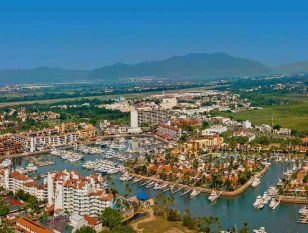
Many people who decide to buy real estate in the Costa Vallarta region do so with the intent to rent out their property when they are not using it. There are a number of options to do so, ranging from taking care of it yourself or having a rental company do so for you. Doing it on your own can be demanding, especially if you aren’t in town to ensure the property is ready for the rental, provide access to the people who will be renting, and take care of any repairs or maintenance that need to be done before or during a rental. Having a property-rental management company takes away a lot of the headaches as they can do this all for you. They can also assist with the proper filing of any revenues you may generate with the local tax authority (SAT).
Rental Income and Tax Reporting
When discussing rentals, it is important to understand the difference between the terms “rentals” and “lodging.” This is not always easy to do and often left open to interpretation. What’s important is “whose" interpretation.
Where we can find clarity is at either end of the spectrum: If a property is being rented long-term with an annual lease, this is clearly considered to be a “rental”. A hotel, on the other hand, can be clearly defined as being in the “lodging” business. As you start shortening the rental period, you begin moving closer towards what may be construed to as lodging. In between is a grey area, open to interpretation, depending who you may be talking to.
As the law stands, short-term rentals, (less than a year), are considered to fall under the jurisdiction of lodging. What is most important, however, for those who are renting, or considering renting their property, is what the position or recent rulings of SAT have been with regards rental income. To date, SAT is primarily interested in knowing that you are registered and filing this income.
It is an important distinction to make for if short-term rentals were to be considered as lodging, and dealt with accordingly, then it would be necessary to have a city business license, pay a hospitality tax, register with the tourism department, be open to health and fire department inspections and fall under the jurisdiction of PROFECO (Mexico’s Consumer Protection Agency). But, as it stands now, for homes and condominiums these procedures are not currently being enforced.
However, whether a short-term rental or a long-term rental, if incomes are received in any way, they have to be reported. The important difference here is with regards to what other forms of taxes or reporting may be necessary if short-term rentals are deemed to be considered "lodging."
Could this change in the future? Definitely. But for now, this is how they see the situation, so if you are registered and paying the taxes owed, chances are you are just fine. If they did change their position this would seriously affect the rental market as an individual homeowner would now have to follow the same practices and procedures as the 200-room hotel down the street.
If you are going to rent and receive income for it, you should report it. It is no different here than it is back in Canada or the U.S. if you were also renting your property. Any taxes you do pay, however, can usually be applied against your tax return back home. Some owners of property in Vallarta believe that if the transaction and the payments for the rental take place in their country of origin, they are fine just filing in that country. That isn’t enough. As the income in generated from a property in Mexico, one needs to report in Mexico as well.
In the past, not reporting income earned was rather common, and it simplified the rental transaction considerably. But today this is not recommended practice. SAT, (the equivalent of the IRS in the U.S. and Revenue Canada), has come a long ways over the past few years, and any Mexican business owner will certainly attest to that. It may have been different in the past, but today, there is no way of avoiding not paying taxes. The last time I visited their offices to provide a digital signature, they also took my fingerprints and did an iris scan - they take tax collection seriously. Furthermore, the tax authorities in the U.S., Canada and Mexico are now working together more than ever, and openly sharing information. So if you are filing the income in the U.S but not in Mexico, they have access now to that information if they want it.
Not paying taxes due in Mexico is dealt with in the same way it is back home, with potential civil and criminal penalties. SAT can use its discretional powers to determine whether you are or not properly reporting income. They can use as a market indicator the occupancy of the hotels in your area (some times as high as 80%) and multiply this times your rate per night. And they can go back more than just the past year, they can go back five years. So, if you rent your property and are not registered with SAT, contact a certified public accountant or a professional property management company, to get registered and start filing and paying taxes. It is not worth losing having your property encumbered for a tax debt and having to pay an attorney to defend you.
Over the past few years SAT has become much easier to work with, if you choose to do this on your own. They have experienced people who are friendly and can walk you through the procedures necessary to become registered as a taxpayer. If you don’t speak Spanish, however, you’ll want someone with you to translate. You can make an appointment online, and find out which documents you’ll be needing to present at sat.gov.mx.
Taxes must be filed monthly where a provisional tax payment of either a flat 25% of the income before IVA, without deductions, or up to 35% on the net income, along with a 16% IVA. (IVA is a “value added tax”, a VAT). When you rent, you should add this 16% onto the cost of the rental - it goes on practically everything.
Most people from the U.S. or Canada will have their property held in a residential trust (fideicomiso). Nearly all trusts allow owners to rent their properties out, but you should check yours just to make sure. You have nearly all the rights of someone who owns a property fee simple, the trust is just a legal requirement for foreigners to hold property rights along the coast and along the border.
Rental Property Managers
There are a number of companies in Puerto Vallarta that can help you with managing your property, as well as your rentals. They’ll ensure the property is ready for the rental, do collections, assist with tax payments, take care of repairs and maintenance and provide you with regular reporting. Providing this service is a range from individuals to high-end, full-service companies and then everything in between. Some prefer just to manage properties while others offer rental marketing services as well. Make sure you have someone you have full confidence taking care of your property. Ask for references and ask others who also are renting what their experiences have been. Also, many local real estate companies have a department that caters to rentals and property management for their clients. The cost for this service usually starts at 20% and goes up, depending on how much of the rental process and taking care of the property is handled by the property manager.
Some of these companies take care of just the property, meaning you could take care of the rentals yourself although you’d then also have to handle tax reporting as well. Today, with the Internet, rental marketing can be done quite easily as there are a number of rental websites such as VRBO.com and airbnb.com. However, most Vallarta rental and real estate companies also have their own online, well established, database of rental properties.
Before renting make sure that renting your property is not going to be a problem with the manager of your building and your homeowner’s association - some frown upon this and may not make it easy for you. But then there are others that are well set up to do exactly that, making it easy for people to rent their properties.
In conclusion, if you are going to rent, don’t take any unnecessary risk. Register yourself with SAT, report your rental income and pay the taxes due.
Written by John Youden of MLSVallarta.com in collaboration with David Connell of Connell & Associados. David is a licensed Mexican lawyer, specialising in real estate law, with an office in Puerto Vallarta.
Similar posts


